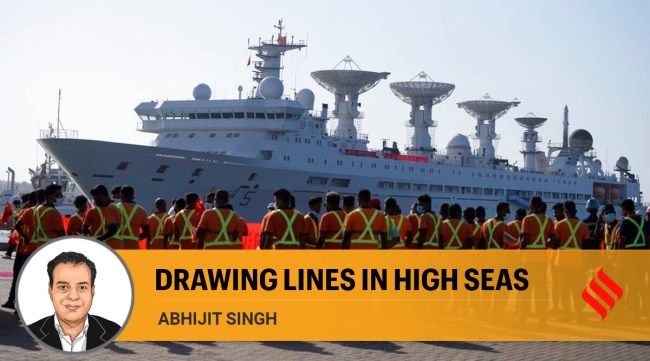Opinion Chinese ship at Hambantota calls for New Delhi to look closely at its maritime strategy
Abhijit Singh writes: Should India demand special rights in its near-seas, especially in circumstances when international law does not fully account for foreign activity that could imperil its national security?
 The visit of the YW-5 raises a larger philosophical question. Can seemingly suspicious foreign activity in a near-littoral be deemed legitimate, if the subject professes to advance a noble cause? (AP)
The visit of the YW-5 raises a larger philosophical question. Can seemingly suspicious foreign activity in a near-littoral be deemed legitimate, if the subject professes to advance a noble cause? (AP) What explains Sri Lanka’s U-turn on the docking of the Chinese ship Yuan Wang-5 at Hambantota? Days after it asked Beijing to defer the visit of its research ship to Hambantota port citing security considerations, Colombo reversed its decision, in apparent disregard of Indian concerns. New Delhi had protested the Chinese vessel’s visit, deeming it detrimental to India’s security.
One explanation for Colombo’s change of heart is that the visiting Chinese ship is not classified as a warship, and therefore, does not warrant being barred entry in a Sri Lankan port. As a space and satellite tracking ship ostensibly, the YW-5 poses no direct threat to India’s “unity, integrity and security” — at least not in a way violative of the 1987 Indo-Sri Lankan Accord, which calls upon the two countries to prevent foreign activity in their respective territories that could pose a threat to the other. The other possibility is that Sri Lanka authorities succumbed to pressure from China, a key developmental partner for Colombo. Sri Lanka’s initial refusal to allow the docking of the Chinese ship had upset Beijing, with Chinese officials lashing out at Colombo for its “senseless attempts” to prevent what they saw as mere “replenishment” of a research ship.
What could have tipped the scales of opinion in Colombo in favour of China, however, is a seeming reconsideration of the matter in India. Former Indian Chief of Naval Staff, Admiral Arun Prakash (‘Step back from water’s edge’, IE, August 10) called for a dispassionate examination of the issue, reminding decision makers in New Delhi about the futility of stopping a Chinese research ship from entering Sri Lanka. Having fully achieved its ambition of becoming a “maritime great power”, China, Admiral Prakash pointed out, was entitled to scientific research activity. Not only was India’s objection to visit of the YW-5 not in keeping with the provisions of the UNCLOS (that permits unfettered freedom of navigation on the high seas, and acknowledges a foreign warship right to berth at a foreign port with prior consent), New Delhi’s stand, he averred, is unmaintainable in the face of China’s possession of Hambantota port for a period of 99 years. Moreover, electronic snooping by foreign ships, aircraft and satellites, he noted, is a regular affair today. With precautionary policies and procedures in place, there was seemingly little in the YW-5’s visit that materially threatened Indian interests.


It seems there are two ways to construe the possible hazards posed by the YW-5. One is to indeed acknowledge that in an age of transparency, surveillance at sea is a legitimate activity. Admiral Prakash is right to observe that friendly and hostile forces carry out snooping in the Asian littorals regularly, with regional states keeping track of foreign surveillance in their waters. The other way to view the Yung Wang 5’s deployment, however, is to see it in the context of China’s evolving Indian Ocean strategy — not to physically dominate the region, but to create a permissive environment for its military activities. China rarely demonstrates naval power in the Indian Ocean; its approach is aimed essentially at expanding stakeholdership in the littorals through a gradual expansion of quasi-military presence. In the Bay of Bengal and Andaman Sea, China has been sending not warships, but survey and research vessels, as a way of marking presence in the region. Beijing’s gameplan is to demonstrate to India and other Bay states that Chinese activities in the littoral are in keeping with China’s rising global heft. It has sought to reassure states that unless necessitated by operational reasons, it would desist from deploying warships in foreign ports.
Yet China is always pushing the envelope — both in the Western Pacific and the Indian Ocean. In the South China Sea, China uses maritime militias to threaten any activity deemed inimical to Chinese sovereign interests. The Chinese policy in the Indian Ocean is gradual and relentless encroachment that expands China’s tactical space, and asserts Beijing’s rights and interests in spaces outside its sphere of natural influence. The approach isn’t necessarily a threat to regional powers, but it willy-nilly undermines the latter’s capacity to compete with China. Even if not inherently malevolent, it is hard to deny that China’s strategy manifests in ways damaging to the interests of other countries.
The touchstone for whether China’s activities in Sri Lanka are kosher would be whether those actions are acceptable to Sri Lankan strategic experts. Here, the majority view appears to suggest that Chinese deployments are problematic. China’s goal, Sri Lankan experts say, is to use Lanka indebtedness to display strategic heft. Beijing, they suggest, is intent on putting Hambantota port to dual use, commercial and military. Part of the plan is to build the capability to move and manoeuvre ships at the port with a military purpose.
The visit of the YW-5, then, raises a larger philosophical question. Can seemingly suspicious foreign activity in a near-littoral be deemed legitimate, if the subject professes to advance a noble cause? Should a revisionist power be allowed to ride unchecked on the back of a body of international rules that privileges user-state rights, over the security concerns of littoral nations? It is certainly a question for New Delhi to consider. Should it do what’s required by law (and propriety), or should it hew close to national interests and demand special rights in its near-seas, especially in circumstances when international law does not fully account for foreign activity that could imperil India’s national security (much like Chinese opposition to any external interference in the South China Sea)? The jury clearly is out on this one.
The writer is a Senior Fellow and Head of the Maritime Policy Initiative at the Observer Research Foundation, New Delhi




